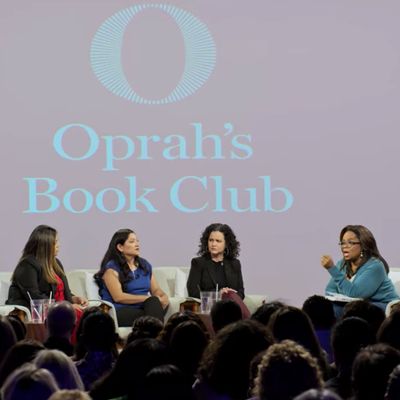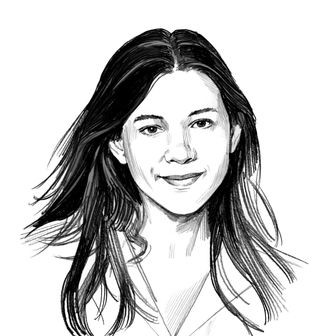
The highly anticipated, already-controversial American Dirt episode of Oprah’s Book Club on Apple TV+ dropped on Friday and, just as Oprah promised in January, it brought “people together from all sides to talk about this book, and who gets to publish what stories.” In the two-part special filmed in front of a live audience in Tuscon, Oprah gave a platform to author Jeanine Cummins, vocal Latinx critics of the book and members of the DignidadLiteraria movement, scholars and volunteers specializing in migrant trauma, publishing gatekeepers, migrant mothers, and people living in America under DACA. Here are the most resonant moments from the two-part episode.
Oprah gives an opening address.
Oprah opens up the episode by addressing the crowd with the following monologue about her beliefs about artistic liberty, and how she’s been listening to the conversation about who gets to tell what stories:
My belief is that reading allows people to feel all aspects of the human experience more deeply. So I fundamentally, fundamentally believe in the right of anyone to use their imagination and their skills to tell stories, and to empathize with another story. To write, and to act, to sing to create to perform, whatever they choose. And if one artist, one author, I felt, is silenced, we’re all in danger of the same. So the furor around American Dirt has sparked a number of questions about who has the right to tell what stories, who books are chosen to be published, which authors’ voices are amplified, which still struggle to be heard. And I hear and I respect that dialogue, and I’m looking forward to have that conversation today.
There’s a social-media montage.
For those members of the audience who are maybe less online than others, Oprah invites American Dirt author Jeanine Cummins onstage and immediately has her sit through a montage of tweets and comments, both positive and negative, about her book, read aloud by voice actors like they were Civil War letters in a Ken Burns documentary. Cummins remains stoic while tweets like “some stories are not yours to tell” and “HARD PASS” flash onscreen above her.
Cummins is held accountable for some of the more objectionable language in her book.
Namely, Oprah asks Cummins to explain her rationale behind the author’s note in which Cummins cursorily acknowledges her privilege and writes that she wishes someone “slightly browner” than herself had written it. Cummins responds, “I think it’s indicative of my own grappling with identity in these pages. I never meant to suggest that people haven’t already written their migrant stories. I think it was a very clumsy phrase. I wish I hadn’t used it.” Cummins also explains that she was “afraid of getting things wrong” when telling this story, but was inspired to go ahead with it “a week before the 2016 presidential election” following a death in the family.
A panel of three Latina writers who had all published pieces criticizing American Dirt and its selection for Oprah’s Book Club are invited onstage to share their opinions and concerns.
Author Reyna Grande explains, “When we approach a publisher with our stories, what we are told is our stories don’t matter, our stories don’t sell well, because readers are not interested in these kinds of stories, and they make us feel ashamed about our immigrant experiences” and notes the double standard, marketing budget, resources, and “fanfare” given to Cummins’s “white” perspective, in contrast. Writer Julissa Arce explains how stories like Dirt should not be taken as representative of the full spectrum of migrant experiences, and calls for more platforms for the stories of Dreamers who find themselves in limbo “because this administration has rescinded DACA,” asylum seekers, families separated at the border, and people in detention.
The panel also tells off the MacMillan President and American Dirt’s Flatiron publisher to their faces.
We have to give Oprah credit for making good on her promise of creating a space where both sides can interact. The third Latina writer on the panel, Esther Cepeda, directly calls out Don Weisberg, president of MacMillan, and Amy Einhorn, American Dirt’s Flatiron publisher, who are in the audience. When Weisberg weighs in on what he’s learned from the backlash, saying that they’ve “hired strategists” and “consultants,” Cepeda immediately fires back with: “Did they tell you to hire more Latinos?” The women on the panel also express their disappointment with the offensive language Flatiron used in their statement canceling the book tour, which framed it around an image of angry Latino violence.
Oprah visits the border wall.
In part two of the special, Oprah visits the border wall in Nogales, Arizona, accompanied by Luz Maria Garcini, a scholar specializing in trauma in Latinx migrant communities, who herself was a migrant mother from Mexico. As they walk along the barbed wire-topped wall, Garcini explains the irreparable, lifelong traumas dealt with by those who make the journey and face violent altercations and separations under U.S. Border Patrol, and stresses that those who attempt to make the border crossing do so out of necessity “for shelter and safety.”
Real migrants tell their stories.
Oprah then devotes the rest of the episode to letting migrants from Mexico, El Salvador, Honduras, and Guatemala share their stories. One woman in the audience now lives in Arkansas, and shares stories of sexual violence that she faced during the process of crossing the border. A man in the audience explains the violent, frightening treatment he faced as a child at the border and how he lives under the stress and fear that “it is very likely that DACA will be rescinded,” under this administration and the current Supreme Court, and the uncertainty stemming from the fact that “the nine justices in the Supreme Court will decide our future.” He also has this to say for American Dirt: “I’m sure Oliver Twist was not a perfect book for its time.” The episode ends with a segment where anonymous mothers at migrant shelters at the Mexican border were interviewed about their experiences traveling thousands of miles to the border with children. This part of the episode is much more enlightening, moving, urgent, and tragic than the book talk in part one, illustrating how powerful it can be when institutions give a platform to migrants to tell their own stories.


